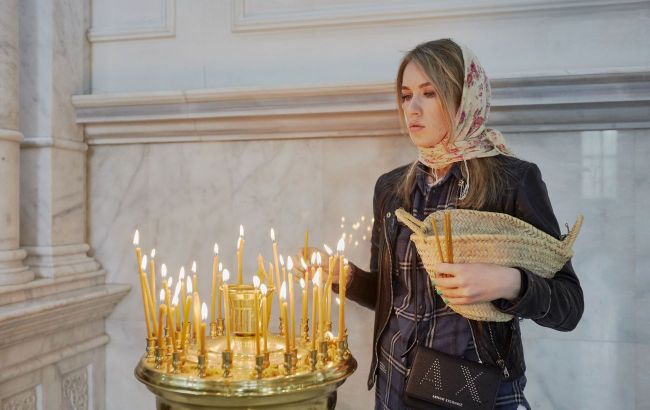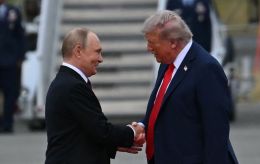Brace for worst-case scenarios: Will Russia dare to strike on Easter?
 Illustrative photo: the enemy may attack Ukraine on Easter (Vitalii Nosach, RBC-Ukraine)
Illustrative photo: the enemy may attack Ukraine on Easter (Vitalii Nosach, RBC-Ukraine)
For the fourth year in a row, Ukrainians will celebrate Easter under martial law. Given that the Russian Federation may be guided by dates when planning its attacks, it is possible that it could strike directly on this great holiday.
Detailed information about the threat of airstrikes on Easter can be found in the RBC-Ukraine material below.
Takeaways
-
Will the Kremlin dare to launch terror on Easter night?
-
What might Russia be planning for one of the most important religious holidays?
-
Is the energy truce really ending before Easter, and what does this mean for Ukraine?
-
Why should we prepare for the worst-case scenario?
-
Mass strikes or targeted ones — what tactics might the aggressor choose for Easter?
What is known about the threat of Russian attacks on Easter
Lithuanian Foreign Minister Kęstutis Budrys warned that the Kremlin may attempt a large-scale attack specifically during the holiday period.
Describing the Russian bombing of Sumy, which claimed 36 lives on Palm Sunday, as a barbaric attack, he has no doubt that Moscow may carry out an even more brutal strike over the Easter weekend. Budrys believes such ruthless actions by the Kremlin could become a turning point, intensifying Western pressure on Russia.
"This week is Holy Week, we'll reach Easter - I do not doubt that Russia will present something even more dreadful on Easter. Perhaps a turning point will come when we'll say, 'Look, sanctions need to be strengthened,'" said the Lithuanian Foreign Minister.
Notably, before Easter, which this year falls on April 20, Russia may announce the end of the so-called 30-day energy truce, according to analysts from the US Institute for the Study of War (ISW). The Russians consider the start date of the ceasefire regime to be March 18, while Ukraine officially stated that the agreements were to take effect from March 25.
Therefore, according to ISW’s assessment, after announcing the end of the truce, Russia may intensify long-range strikes on Ukraine in the coming days.
Military expert and former Deputy Chief of the General Staff of the Armed Forces of Ukraine, Ihor Romanenko, commented to RBC-Ukraine that the aggressor may resort to provocations during Easter.
"We are talking about the likelihood of this process. There are corresponding plans and tools to carry out missile and drone strikes. As for Easter, Putin is trained in the KGB on choosing dates and using them. He knows the importance of these dates. We saw what he did on Palm Sunday," said Romanenko.
He added that Ukrainian intelligence and allied intelligence will continue to verify information regarding potential mass attacks by Russia, particularly on Easter.
"But we need to prepare for the possibility that there may also be provocations on this day, particularly in the form of strikes. Therefore, we should be prepared for the worst-case scenarios. For example, the use of ballistic missiles and Shaheds, among other things. So, during this major religious holiday, our citizens need to stay vigilant," emphasized Romanenko.
However, whether the enemy will focus on a specific target or spread their forces in case of an attack remains an open question. It all depends on the aggressor's decisions.
"By this time, for example, by April 18, time will pass. The situation will change, and Putin will make a military-political decision before the attack, and the military will then carry out the plan," the expert explained.
As for the tactics of the enemy's shelling, recently, they have not only been striking scattered objects but also focusing on a couple of settlements, concentrating, for instance, 15-20 Shahed drones and adding missiles.
"This is done so that one or two settlements feel the most powerful impact," the source clarified.
Easter in Ukraine: Where security measures have been implemented
It is important to note that during Easter night in 2025, a curfew will be in place in most regions of Ukraine. However, some areas have decided to shorten their duration.
Meanwhile, the Ivano-Frankivsk Regional Military Administration has announced the cancellation of all public events for Easter due to the heightened risk of missile strikes. This decision was made by the Regional Defense Council.
Earlier, Kyiv urged religious communities to limit large-scale Easter services. The Kyiv City State Administration appealed to religious leaders to minimize in-person Easter services and provide online broadcasts on Ukrainian media and platforms.
Communities have also been advised to take basic safety precautions — informing worshippers about actions to take during air raids and reminding them of the locations of nearby shelters.
It is important to emphasize that recently, the aggressor country has intensified and continues its terror against Ukrainians. Evidence of this includes strikes with numerous casualties in Kryvyi Rih and Sumy. As RBC-Ukraine noted, it is not ruled out that Russia will continue targeted attacks on civilians as part of its strategy.
Sources: an interview with Lithuania's Foreign Minister Kęstutis Budrys for the ELTA program, a report from analysts at the US Institute for the Study of War (ISW), a statement from Ivano-Frankivsk Regional Military Administration Head Svitlana Onyshchuk, a communication from the Kyiv City State Administration, and an exclusive comment from former Deputy Chief of the General Staff of the Armed Forces of Ukraine Ihor Romanenko.

